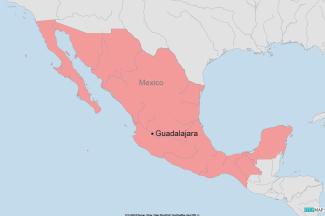Sustainable cities
Experiment to reclaim the street for the people

Across the world, several street experiments are being implemented to reclaim the street for the people and create opportunities for social engagement. An example of these experiments is the closing of streets – known as ciclovías – for non-motorised transportation, such as “Vía Recreactiva” in Guadalajara, one of the three largest cities in Mexico.
The Vía Recreactiva is a social programme that converts public roads into places for leisure and recreation for all people. It began in September 2004 with 11 kilometres of bike lanes, now it covers 70 kilometres through four central municipalities of the Metropolitan Area of Guadalajara and with around 100,000 people attending every Sunday.
Ciclovías repurposes streets by closing main and commercial roads to give priority to humans over automobiles. And it is important to allow citizens to see that. “Many times, people are not aware of the amount of space that we dedicate in our cities to move and store cars, and ultimately it is very important to reclaim this public space,” acknowledges Diego Marquez of the Institute for Planning and Development Management of the Metropolitan Area of Guadalajara (IMEPLAN).
For several hours, streets become exclusive bike paths while other urban spaces are transformed into amusement parks. The urban space becomes a place for the individual and collective appropriation of public space, in which play, sports, art, dance, performance and commerce bring citizens together in a space that creates a sense of community.
For Fernanda Aguilar, an architect and urban planner, “temporary or sporadic interventions such as the Vía Recreactiva have the purpose of occupying the street so that there begins to be more interaction among people, where nearby there is a park with a yoga class, and in another park, there is a Zumba dance class, that same intervention and appropriation make other spaces come to life and create a perfect excuse to start having other social dynamics evolve.”
In the last 10 years, Guadalajara has been moving towards more sustainable urban mobility. Diego Marquez points out that there are around 200 kilometres of bike lanes built and 360 public bike stations installed. These changes are giving rise to new ways of using the streets, as younger generations cannot conceive of a city in which bicycles no longer exist. “Just as we see it as normal that there are so many cars outside, we will begin to see as normal that we have wide sidewalks, that we have safe infrastructure, spaces for rest,” says Diego.
The Vía Recreactiva is a transformative urban shift that has been sustained for 20 years despite changing governments. These efforts have been supported by civil society, government officials and urban planners who continue to push for more equitable access to public spaces and reshaping the city towards a more vital, sustainable and healthy environment.
Pamela Cruz is the Special Projects Coordinator at Comunalia, a network of community foundations in Mexico.
pamela.cruzm@gmail.com












